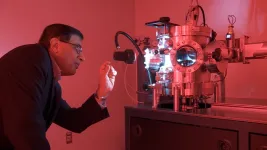(Press-News.org) Heart transplant recipients receiving organs from active COVID-19 positive donors may have an increased risk of death at six months and one year when compared to those receiving organs from recently recovered COVID-19 patients and COVID-19 negative patients, according to a study published today in the Journal of the American College of Cardiology.
“These early trends should be concerning enough such that heart transplantation centers need to thoroughly evaluate and continue to weigh the risks/benefits of using hearts from active COVID-19 donors,” said Shivank Madan, MD, MHA, lead author of the study and a cardiologist at the Center for Advanced Cardiac Therapy at Montefiore Medical Center/Albert Einstein College of Medicine in New York.
The COVID-19 pandemic presented challenges for heart transplantation since transplant centers had to continuously modify their recipient and donor management protocols as the pandemic and understanding of the virus evolved. There continues to be a lack of data around long-term outcomes of transplants from COVID-19 infected donors, especially as new virus variants emerge.
Researchers in this study sought to determine utilization trends and outcomes of heart transplants using COVID-19 donors. According to researchers, this data is especially important because COVID-19 virus can cause endothelial dysfunction and myocardial injury in potential donors that may manifest only sub-clinically pre-transplant; currently there is no clear consensus regarding evaluation and use of COVID-19 donors for heart transplants.
The study looked at more than 27,000 donors in the United Network for Organ Sharing (UNOS) between May 2020 and June 2022; in total, donors were given more than 60,000 COVID-19 tests prior to organ procurement. Donors were considered COVID-19 donors if they tested positive at any time during terminal hospitalization. Active COVID-19 status was given to those who tested positive within two days of organ procurement and recently resolved COVID-19 status was given to those who tested positive initially but became negative prior to procurement.
Of the donors in UNOS, 1,445 were identified as COVID-19 donors, of which 1,017 were classified as active COVID-19 donors and 428 were recently resolved COVID-19 donors. Overall, 309 heart transplants used COVID-19 donors and 239 of those met study criteria.
Those receiving heart transplants from active COVID-19 donors had increased risk of mortality at six months and one year (7% vs 13.8% at six months and 9.2% vs. 23.2% at one year for non-COVID-19 vs. active COVID, respectively). Those receiving transplants from recently resolved COVID-19 donors had similar six-month and one-year mortality rates as those receiving transplants from non-COVID donors (7% vs. 8.5% at six months and 9.2% vs. 13.6% at one year for non-COVID vs. recently resolved COVID, respectively).
Researchers also found that during the study period there was increasing use of COVID-19 donors but that transplant centers were selective and mostly used donors who were younger and about 80% were male. Also, potential donors were tested for COVID-19 multiple times prior to organ procurement, with those who had at least one positive test receiving subsequent tests more often than those who tested negative the first time.
Limitations of the study include variation in the timing and frequency of COVID-19 testing during terminal hospitalization and lack of information on COVID-19 disease activity, including Ct values to indicate viral load, date of disease onset and symptom burden, or vaccination status of donor or recipient. The authors also emphasized that this is still early data, and continued evaluation of COVID-19 donors with larger sample size, longer follow up and newer variants of COVID-19 is needed.
The American College of Cardiology envisions a world where innovation and knowledge optimize cardiovascular care and outcomes. As the professional home for the entire cardiovascular care team, the mission of the College and its more than 56,000 members is to transform cardiovascular care and to improve heart health. The ACC bestows credentials upon cardiovascular professionals who meet stringent qualifications and leads in the formation of health policy, standards and guidelines. The College also provides professional medical education, disseminates cardiovascular research through its world-renowned JACC Journals, operates national registries to measure and improve care, and offers cardiovascular accreditation to hospitals and institutions. For more, visit acc.org.
The ACC’s family of JACC Journals rank among the top cardiovascular journals in the world for scientific impact. The flagship journal, the Journal of the American College of Cardiology (JACC) — and family of specialty journals consisting of JACC: Advances, JACC: Asia, JACC: Basic to Translational Science, JACC: CardioOncology, JACC: Cardiovascular Imaging, JACC: Cardiovascular Interventions, JACC: Case Reports, JACC: Clinical Electrophysiology and JACC: Heart Failure — pride themselves on publishing the top peer-reviewed research on all aspects of cardiovascular disease. Learn more at JACC.org.
###
END
University of Queensland-led research has revealed liver cells influence the body’s internal circadian clock, which was previously believed to be solely controlled by the brain.
Associate Professor Frédéric Gachon from UQ’s Institute for Molecular Bioscience and Dr Serge Luquet from Université Paris Cité/CNRS in France and their collaborators have demonstrated that mice with transplanted human liver cells had modified circadian rhythms.
Dr Gachon said the ...
Researchers in the Department of Biomedical Informatics (DBMI) at the University of Colorado School of Medicine have reached a major milestone in developing standards and tools for creating phenopackets that may foster more innovation and advancement in the medical field by allowing health professionals to more easily collect and share data.
A newly-released paper highlights the latest suite of coordinated standards and tools used to collect data related to rare diseases.
The phenopackets, ...
The ECOG-ACRIN Cancer Research Group (ECOG-ACRIN) announces the following cancer researchers as the recipients of the organization’s annual scientific leadership and mentorship awards. Through its Mentoring Program, ECOG-ACRIN formally recognizes outstanding scientific leadership through events and awards that identify, encourage, and recognize investigators in the early years of their careers. The program is expanding in 2023 with the addition of the Remarkable Mentor to Women in Oncology Award.
Young Investigator of the Year
Patrick M. Forde, MBBCh, is the 2023 recipient of the Young Investigator Award, a professional honor to recognize ...
BIRMINGHAM, Ala. – Yogesh Vohra, Ph.D., is the principal investigator of a five-year, $8 million grant from the United States Department of Energy’s National Nuclear Security Administration Stewardship Science Academic Alliances program that supports fundamental research in materials under extreme conditions and in advanced manufacturing.
Vohra, a professor university scholar in the University of Alabama at Birmingham Department of Physics and associate dean in the UAB College of Arts and Sciences, says the grant will leverage the expertise of nine faculty members across five disciplines at UAB and the University of Massachusetts-Amherst, ...
Contacts:
David Hosansky, NCAR/UCAR Manager of Media Relations
hosansky@ucar.edu
720-470-2073
Ali Branscombe, NCAR/UCAR Communications Specialist
abran@ucar.edu
651-764-9643
A new computer modeling technique developed by scientists at the National Center for Atmospheric Research (NCAR) offers the potential to generate months-ahead summertime drought forecasts across the Western United States with the capability of differentiating between dry conditions at locations just a couple of miles apart.
The technique uses statistical methods and machine learning to analyze key drought indicators during the winter and spring and correlate them with the likelihood of dryness throughout the ...
In everyday life we experience light in one of its simplest forms – optical rays or beams. However, light can exist in much more exotic forms. Thus, even beams can be shaped to take the form of spirals; so-called vortex beams, endowed with unusual properties. Such beams can make dust particles to spin, just like they indeed move along some intangible spirals.
Light modes with such added structure are called “structured,” and even more exotic forms of structured light can be attained in artificial optical materials – metamaterials, where ...
Surviving a stroke can bring many long-term effects – including a much higher risk of dementia. But a study suggests that blood sugar may play a key role in that risk.
Loss of general thinking ability happened much faster in stroke survivors who had high blood glucose in the years after their health crisis, even after accounting for other things that might affect their brainpower, according to a study published in JAMA Network Open.
Those whose blood pressures or cholesterol were high after their stroke did not lose points on tests of thinking ability, ...
WASHINGTON – Researchers at Georgetown University Medical Center, in collaboration with George Washington University, leveraged their understanding of auditory speech processing in the brain to enable volunteers to perceive speech through the sense of touch. This may aid in the design of novel sensory substitution devices -- swapping sound for touch, for example -- for hearing-impaired people.
The findings appear in the Journal of Neuroscience on May 17, 2023.
“In the past few years, our understanding of how the brain processes information from different senses has expanded greatly as we are starting to understand how brain networks are connected across different ...
DETROIT (May 17, 2023) – Researchers at Henry Ford Health — one of the nation’s leading integrated academic medical institutions — in collaboration with Ephemeral Tattoo, have conducted a study on the safety and efficacy of made-to-fade tattoos for medical markings.
Fifty to 60 percent of cancer patients receive radiation therapy during their course of treatment. Patients have traditionally been required to receive small, permanent tattoos on their skin to ensure therapy is delivered accurately to the same place each time while minimizing healthy tissue exposure to radiation. On the heels of this study, Ephemeral will offer its innovative made-to-fade ...
In testing the genetic material of current populations in Africa and comparing against existing fossil evidence of early Homo sapiens populations there, researchers have uncovered a new model of human evolution — overturning previous beliefs that a single African population gave rise to all humans. The new research was published today, May 17, in the journal Nature.
Although it is widely understood that Homo sapiens originated in Africa, uncertainty surrounds how branches of human evolution diverged and how people migrated ...



